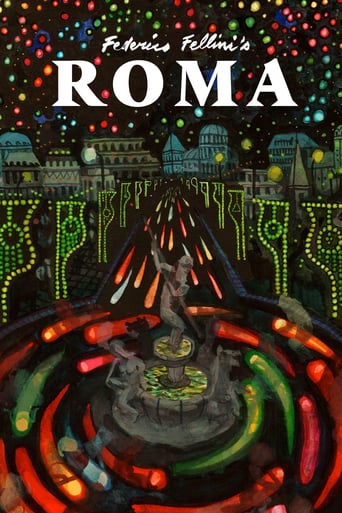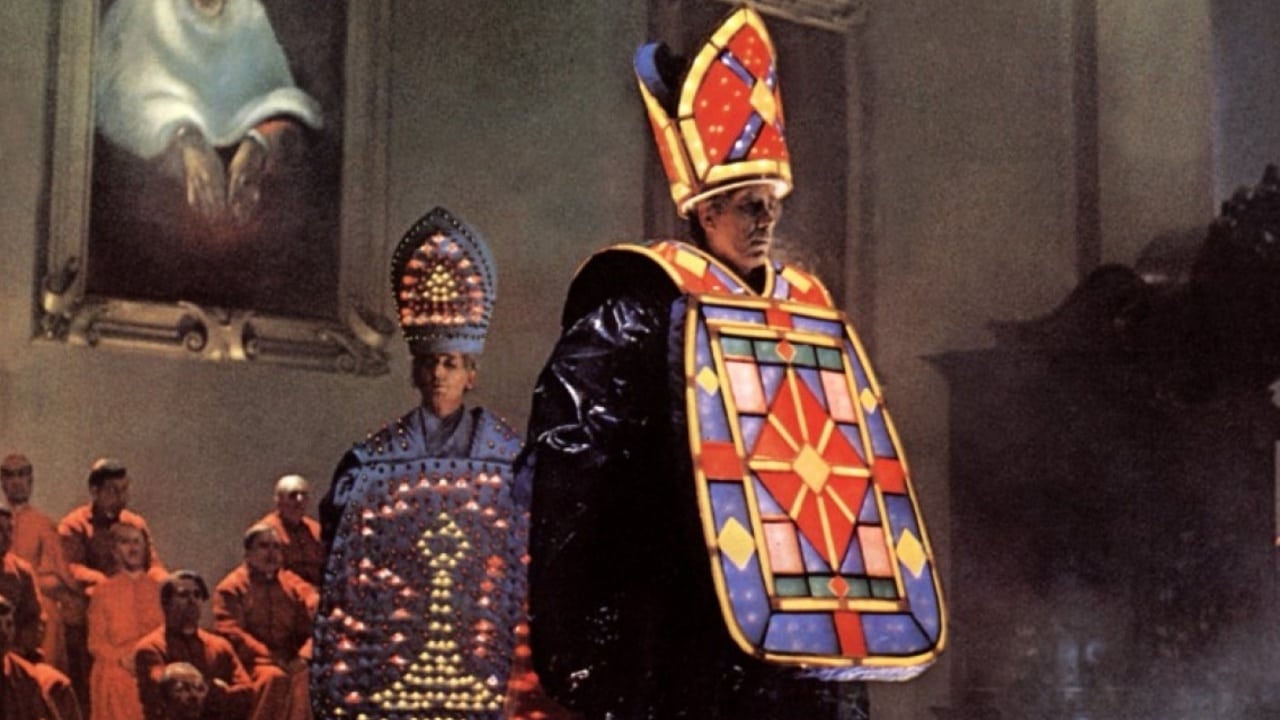stormhawk2018
Millennial Rome, which has witnessed eras and eras, which has seen so many generations of human beings passing and has contemplated its greatness and its ignominy, continues standing, resurfacing constantly from its ashes, rising upon itself again and again. Who doubts that Rome is touched by the grace of the venerable and of what endures in the midst of chaos and change? It will not last forever, and someday it will be lost along with all that is here, the living and the inert ... But we can say that we have lived and lived, and Rome will have seen part of the parade of the aeons. Fellini, one of the most exalted, controversial and experimental film directors of the twentieth century, hunts to perfection that heroic resistance of the city, its halo of eternity coupled with daily life. Because Fellini was able to transfer to the celluloid, with that genius that is only granted to a few, the cyclical course of time, outlining with concrete lines concrete epochs and behaviors and lifestyles that strongly identify the Italian people and, by extension, what We are all in essence. Fellini always gets us to recognize ourselves in some gesture, some custom, some way of thinking, some way of conceiving life. Fellini was a philanthropist who loved every frame he shot, every bit of throbbing life that was etched into every inch of film. In short, he was able to capture his entire life in an instant. Wishing to pay his particular homage to his beloved Rome, his intimate Rome as well as universal Rome, Fellini filmed a testimony midway between documentary and autobiography, a historic, endearing, raw, sordid, painful and joyful legacy that perhaps Is one of the most realistic, surreal and beautiful films that have been filmed on the Eternal City.There is no more protagonist than the city itself and everything it contains. Through a few leaps in time, Fellini takes the camera through various places and enters the heart of the city, capturing the environments warmed by the severe heat of the Mediterranean, crowded with people of all conditions: resigned housewives loaded with children Crying and mischievous; Speechless men and brawlers; Entire families who rested from the hard daily chores at the movies and those Sunday dinners on the overcrowded restaurant terraces; Prostitutes who expose and punish their charms in a fleshly sale of meat; People who make a living acting in variety shows before a suburban and provocative public; The numerous teams of workers who left their skin in the titanic works of the Roman subway, a very complicated task hampered by the continuous discovery of archaeological remains in the strata buried beneath the city; The chaotic traffic, another protagonist more of the crowded city; Television crews and journalists who register their exuberant spirit; People of the high aristocracy slaughtered by the nostalgia of past splendor, already buried; The clergy, represented by its maximum figure, the Supreme Pontiff ... From surrealism to the most cruel realism, from the tenderness of the simplest to the ruthless coldness of war, from the beautiful to the grotesque, from praise to satire and ridicule, from pessimism to optimism, from the past until the present... Everything is concentrated in that Rome that laughs and cries and that breathes and that moves without ceasing. Who laments for the irretrievable, for the trampled vestiges of times that preceded us, for the ingratitude of time and neglect. Who shudders at the many human pains, unable to remain indifferent. What a fuss with the children's games. That ignites with unleashed passions. He is ashamed of the unthinkable and shameful. She prides herself. It beats at the rate of tachycardia. That is carried away by the hope of knowing that it will continue to dawn. Rome, the Eternal City, an explosive gift for the soul and the senses concentrated in two hours shot by a master who knew how to x- ray the carnality of the spirits.
TheLittleSongbird
Of the five movies so far I have seen of Fellini's, Roma is my least favourite, but that doesn't mean at all that it is a bad film. It's just that I think La Dolce Vita, 8 1/2 and Amarchord are masterpieces and La Strada a near-masterpiece.Roma while perhaps being the most personal of Fellini's films for me was just very, very good. For my liking, Fellini occasionally shows a lack of intellectual rigour and when he is reminiscing and chatting with the likes of Marcello Mastroianni while mostly companionable and insightful there is the odd occasion where he comes across as a tad overbearing.However, Fellini more than makes up for it with a very interesting and insightful experimental/documentary-like approach to this film. Mastroianni, Gore Vidal and Anna Magnani are a delight to watch, the film does have a subtle message and told with a lot of heart and Nino Rota's score is atmospheric, nostalgic and lilting. Like all his films, the visuals show a genius at work. The cinematography is spellbinding and The Eternal City is gorgeous. Here Fellini's images are at their best in the 1940s music hall show, the unearthing of the ancient villa and the fashion parade.All in all, enchanting and interesting if not Fellini's best. 8/10 Bethany Cox
bobsgrock
Come and take a tour of the Eternal City with its most famous citizen from the cinema world. Here, Federico Fellini disposes of practically all normal and conventional ways of making a film and uses it for what it may have been intended for primarily. Here, the story is extinct and all we are left with are images, and in the hands of Fellini they are some stunning images. All take place in Rome, that great capital of Italy that has been through so much over the centuries and Fellini attempts to capture all of it. He uses a young man first coming to Rome (representing him), who encounters a small apartment he has to share with about ten other people and children, a huge outside venue where nearly everyone in the area comes to eat and socialize, and then takes a journey to his first brothel, then goes again.As it is with many of his other films, Fellini uses dreams and exaggerations to explore the world of his subject, in this case the city of Rome. It is as he imagines it, which makes it all the more confusing and unusual. The women are big-breasted, loud and mesmerizing, and to watch these people fight, make up, or just talk with one another alone is interesting and funny in the way they express exactly what they are feeling. This frankness is something Fellini admires and it is a characteristic of Rome where things happen because they should, not because people want them to or not. Another interesting aspect was using a film crew to show us the underground of Rome where there is so much more history to be discovered.The ending is just as unconventional as the rest of the film. Here, a large group of people (perhaps representing the city or all the people Fellini knew in his life) ride on motorcycles all throughout the city. As they turn corners and go down main streets, the camera swirls and turns to show us the famous standings in the city that represent it, all coming to an end at the Coliseum. This is the film's finest moment because it is a culmination of all things Roman and all things Fellini. In many ways, it is like the end of 8 1/2 as we watch all these aspects come together, whether you want them to or not. As much as Rome is eternal, it is with a purpose and you cannot change it to your liking, only record what you see. Fellini has done just that.
dromasca
This is not a fiction movie. it needs to be seen with a different perspective. This is a movie about a city, one of the most beautiful and fascinating cities in the world. Fellini describes here the city, his feelings about it, his memories, the history and the people who live in it. One needs to look at this film like looking at a painting of an old master, not like at a fiction film. Then what is exposed to the viewer is a the full world of characters, some of them appearing on screen for a few seconds but stay in memory forever. It is the landscape of today, the memories and the history, the history that when touched by the air of the present melts under our own eyes as it happens in the fabulous underground scene. From the many films of Fellini this is one of the most personal, and a touching one. I loved it.


 AD
AD




